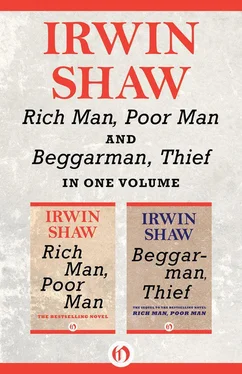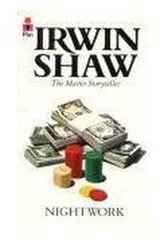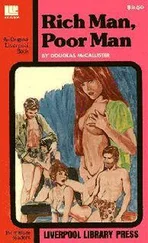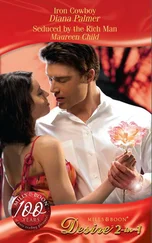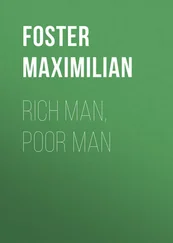“Stay near z’ telephone,” the man said and turned and walked quickly back in the direction of the station.
Rudolph took a deep breath and started walking slowly toward the Croisette and his hotel. He thought of the two men who had ambushed him in the hallway of the house in New York and who had been so furious that a man who looked as prosperous as he did had only a few dollars on him to reward them for their trouble. If anybody mugged him tonight on the dark streets of Cannes, they’d probably leave him for dead after they’d searched his pockets. He didn’t have much more than cab fare left.
« »
Billy was awakened by a knocking on his door. He got sleepily out of bed and barefooted and in pajamas he went over to the door and opened it. Monika was standing there, smoking a cigarette, a raincoat draped over her shoulders like a cape. She came in quickly and he closed the door and switched on a lamp.
“Hello,” Billy said, “I was wondering when you would turn up.” It had been four days since her visit.
“Did you miss me?” She threw off her coat and sat on the rumpled bed, facing him, smiling.
“I’ll tell you later,” Billy said. “What time is it?”
“Twelve-thirty,” Monika said.
“You keep some weird office hours.”
“Better late than never,” she said. “Wouldn’t you agree?”
“I’ll tell you later about that, too,” he said. “The fact is, I like afternoons better.”
“How European you’ve become.”
“What the hell do you do with your afternoons?”
Monika smiled demurely up at him. “Curiosity killed the cat,” she said.
Billy granted. “I see this is your night for clichés,” he said. “Did you remember the name yet of the hotel where you saw my cousin?”
“I am trying hard,” Monika said. “Sometimes it seems to be almost on the tip of my tongue.”
“Oh, balls,” Billy said.
“What a nice word,” she said. She threw her cigarette to the floor and ground it into the carpet. Billy winced. Her manner of dressing had improved considerably but her housewifely instincts were still at the Brussels level. She stood up and came over to him and put her arms around him and kissed him, her tongue sliding softly inside his mouth. His erection was immediate. He tried to think of other things, whether it was time to have the oil changed in his car, whether he wanted to play tennis the next day or not, if he had to get his dinner jacket pressed for the evening performance of Restoration Comedy two nights from then, but it was no good. “Let’s get to bed,” he muttered.
“I was wondering how long it was going to take you to say that.” She chuckled, sure of the hold she had on him.
An hour later she said, “It’s not too bad at night, either, is it?”
He kissed her throat. She wriggled out of his arms and slid from the bed and stood up. “I have to go now,” she said.
“Why the hell can’t you stay the night?” he said, disappointed. “At least once.”
“Previous engagements.” She began to dress. It didn’t take her long. She put on her panties, girlishly plain and white, over her tan, shapely legs and slipped her dress over her head. He watched her, feeling deprived, as she pulled on her ballet slippers and combed her hair in front of the mirror. “By the way,” she said, “we decided to call in our debts.”
A cold chill went over him and he drew the blankets over him. “What do you mean by that?” he said, trying to keep his voice calm.
“The Paris debt,” she said, still combing her hair. “You remember that, I imagine?”
He said nothing and lay absolutely still.
“I’ll tell you what you’re going to do,” she went on, tugging at her tangled hair with the comb. “Two nights from now, you’re going to go to a bar called the Voile Vert on the rue d’Antibes at six P.M. There will be a man there waiting for you. He will have two magazines with him, L’Express and Le Nouvel Observateur. He will be reading L’Express and the Observateur will be on the table in front of him. You will sit down at the table with him and you will order a glass of wine. He will reach under the table and will pick up a sixteen-millimeter movie camera.”
“Only it won’t be a sixteen-millimeter movie camera,” Billy said bitterly.
“You’re learning,” Monika said.
“Will you for Christ’s sake stop combing your hair?” Billy said.
“You will take the camera and when you go into the Festival Hall that evening you will open it and take out what you find in it and hide it in an inconspicuous place. It will be timed to go off at nine forty-five.” Monika finally put the comb down and pushed at her hair with her hands, twisting her body so that she could look at her reflection from the side.
“You must be out of your mind,” Billy said, still with the blankets pulled up under his chin. “At nine forty-five they’ll be running my mother’s picture.”
“Exactly,” Monika said. “No one will suspect you. There will be dozens of photographers with all sorts of cameras. You can wander all over the building without anyone questioning you. That’s why you were chosen for the job. Don’t worry. Nobody’s going to be hurt.”
“You mean it’s going to be a nice, harmless, friendly type of bomb?”
“You should know enough by now not to be sarcastic with me.” Monika turned away from the mirror and faced him. “The police will be called at nine o’clock and told there is a bomb somewhere in the building. They’ll clear the place in five minutes. We’re not out to kill anybody. This time.”
“What are you out to do?” Billy was ashamed of the quaver in his voice.
“A demonstration,” Monika said evenly, “a demonstration which will have the greatest kind of publicity, with newspapermen, television crews all over the place and internationally famous people falling all over themselves to get out of there. If anything represents the rot of the whole system better than this disgusting fat circus, we haven’t heard of it.”
“What if I say no, I won’t do it?”
“You will be dealt with,” Monika said quietly. “When it is done to our satisfaction, I believe I’ll remember what hotel your cousin is at. In the meanwhile I trust you’ll remember—the Voile Vert, the two magazines, six P.M. Good night, laddy.” She picked up her bag, threw her raincoat over her shoulders and went out the door.
« »
As Billy went up the steps of the Festival Hall for the morning showing of Restoration Comedy with Gretchen and Donnelly and Rudolph, he said, “I think I’d like to sit downstairs in the orchestra with the peasants.” The others had reserved seats in the balcony. He kissed his mother and whispered, “Merde.”
“What’s that?” Gretchen asked, surprised.
“It’s French show-business for good luck,” he said.
Gretchen smiled and gave him another quick kiss. “I hope you like the picture,” she said.
“I hope so, too,” he said gravely. He showed his ticket to the man at the door and went into the auditorium. It was already crowded, although the picture was not scheduled to start for another ten minutes. An inconspicuous place, he thought, an inconspicuous place. Everywhere he looked seemed like a highly conspicuous place to him. He went to the men’s room. At the moment it was empty. There was a trash basket for paper towels. It would be possible, given thirty seconds alone, to open the back of the camera, take out the bomb and hide it. If he could manage thirty seconds alone.
The door to the men’s room opened and a man in a flowered shirt came in and went over to the urinals. Billy ostentatiously washed his hands, pulled out a paper towel and dried them. Then he went out and found a seat near the front of the auditorium, where there were still a few vacant places. In the state he was in he didn’t know whether or not he would be able to sit through the picture, which was another reason for not sitting beside his mother for the showing. But when the picture started he found himself immediately engrossed and even laughed with the rest of the audience at the humorous scenes. And Wesley’s performance astonished him. It was Wesley all right, but a Wesley who had somehow blended someone else’s character with his own, to become a boy hidden and besieged, revealing bits and pieces of himself at rare, emotional moments, by a glance, a movement of his head, a mumbled monosyllable, and through it all looking brutally handsome while suggesting sweetness and vulnerable sensitivity, even when the script demanded violence and cynical behavior from him.
Читать дальше
